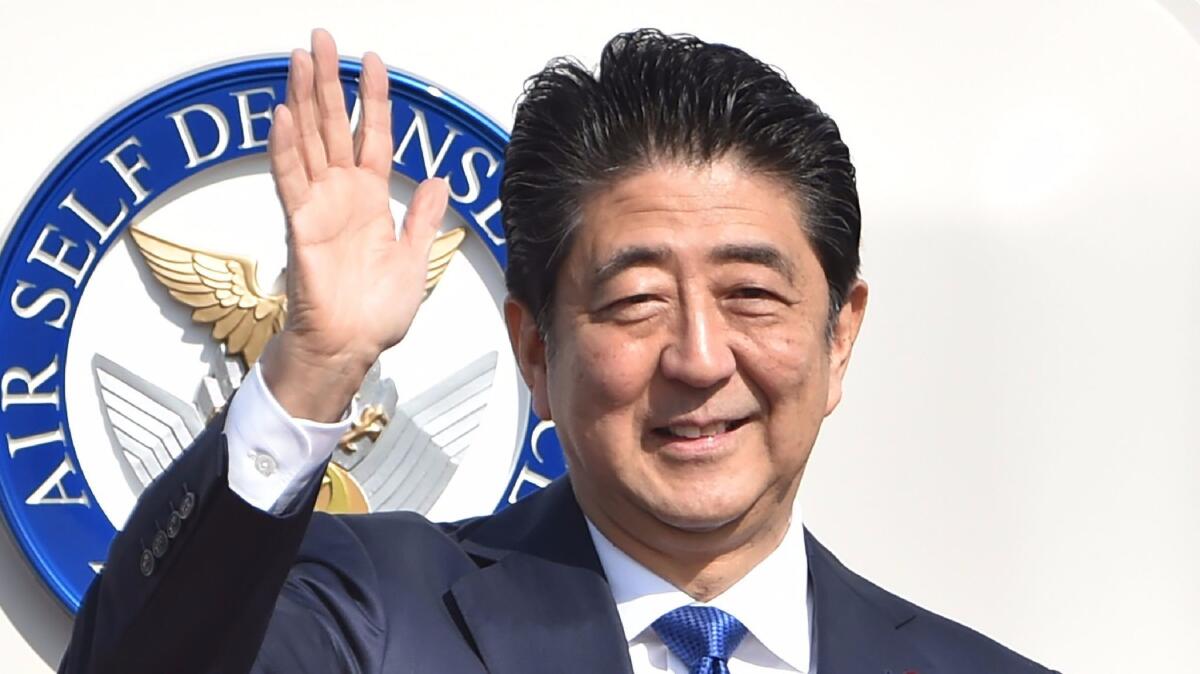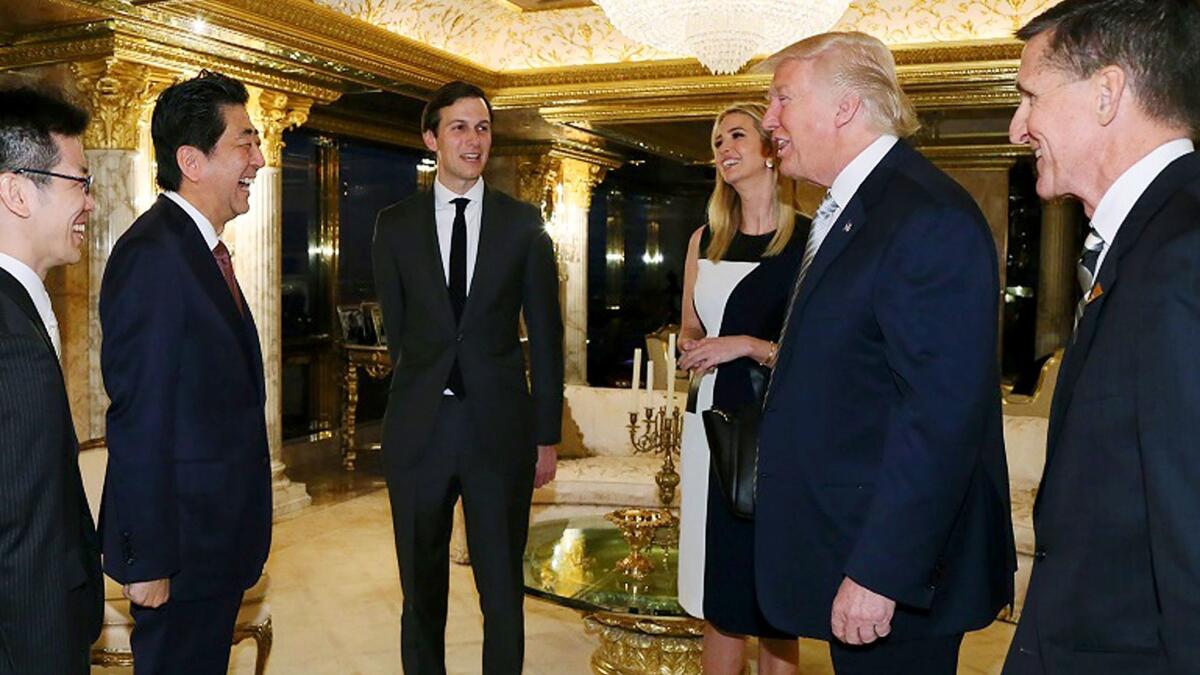Japan’s Shinzo Abe expresses ‘great confidence’ in Trump as a leader after meeting

- Share via
Reporting from New York — Japanese Prime Minister Shinzo Abe on Thursday became the first foreign head of state to meet face to face with Donald Trump since the election.
Afterward, Abe described the meeting as “really cordial” and said he believed he would be able to establish a relationship of trust.
Abe said he conveyed his views on basic issues during the meeting, but declined to provide further details.
“I do believe that without confidence between the two nations [the] alliance would never function in the future and as the outcome of today’s discussion, I am convinced Mr. Trump is a leader in whom I can have great confidence,” Abe said.
Trump’s daughter Ivanka was seen in photos attending the meeting. Trump’s attorney told CNN this week that Ivanka, along with her brothers Donald Jr. and Eric, would be left in charge of the president-elect’s businesses through a blind trust.

Abe had been expected to press the president-elect on how much of his bluster was campaign rhetoric or actual policy.
Before flying in from Japan, Abe said he was thrilled to be the first foreign leader to get an audience with Trump.
“The Japan-U.S. alliance is the axis of Japan’s diplomacy and security,” Abe told reporters in Tokyo. “The alliance becomes alive only when there is trust between us. I would like to build such a trust with Mr. Trump.’’
Behind the polite words lies deep trepidation. Japan was one of the countries most rattled by Trump’s upset victory in the Nov. 8 election.
During the campaign, Trump accused Japan of essentially freeloading off the United States by not paying sufficiently for the 54,000 U.S. troops stationed there — in fact it pays about $1.7 billion a year — and then stunned the Japanese by saying they should build a nuclear weapon to protect themselves against nuclear-armed North Korea.
“There is real existential shock here,’’ said Sheila Smith, a Japan expert with the Council on Foreign Relations who is currently in Tokyo. “It was just unbelievable to them that a presidential candidate would call into question the defense treaty. They didn’t know if these comments made by then-presidential candidate Trump were real or campaign rhetoric.’’
After Japan’s defeat in World War II, the United States directed the writing of a pacifist constitution that kept the country dependent on U.S. power for its defense. Although that constitution has been weakened by Abe, a nationalist who wants to bolster his country’s defense forces, the Japanese population remains deeply opposed to nuclear weapons, as the only people in the world ever to have been attacked with them.
The Japanese also have been worried about Trump’s stance against free trade, especially his opposition to President Obama’s Trans-Pacific Partnership.
Nevertheless, another Japan expert believes that Trump and Abe, both avowed conservatives, might get along better than expected in person.
“If you bear in mind how right leaning the Abe administration has been … Trump’s election has opened an opportunity for Abe to push through measures to fortify Japan militarily and become more assertive,’’ said Ra Mason, a Japan specialist at the University of East Anglia.
Trump advisor Kellyanne Conway described the meeting Thursday at Trump Tower in New York City as a chance for the two to get acquainted.
“We are very sensitive to the fact that President Obama is still in office for the next two months, and we won’t be making diplomatic agreements today,” she told reporters.
The meeting also comes at a time that Trump’s foreign policy — especially with regard to Asia — remains very much a work in progress. Trump has yet to name a secretary of State. His Asia advisors — Michael Pillsbury, a former Defense Department official, and Peter Navarro, an economist — are more focused on China than other areas of Asia.
Many traditional Republicans in foreign policy have blasted Trump’s ideas about weakening the defense alliances that date to the end of World War II.
“In short, if the Trump brand ... becomes America’s brand, we can expect ruinous marginalization in Asia and unwanted compliance with rules which the Chinese and other challengers set,” a group of eight former Asia specialists who served past Republican administrations wrote in an open letter in mid-August.
However, Trump does appear to be taking advice on foreign policy. On Thursday, ahead of the Abe meeting, Trump met with former Secretary of State Henry Kissinger. According to a statement from Trump’s transition team, “they discussed China, Russia, Iran, the EU and other events and issues around the world.”
The Associated Press contributed to this report.
ALSO
China to Trump: We didn’t make up climate change
On Capitol Hill, Pence’s high-profile role in Trump transition assures lawmakers
Trump supporter cites Japanese American internment to justify registering Muslim immigrants
UPDATES:
7 p.m.: This article was updated to note that Ivanka Trump sat in on the meeting.
4:30 p.m.: This article was updated with quotes from Abe about the meeting with Trump.
4:15 p.m.: This article was updated to reflect that the meeting between Abe and Trump has ended.
This article was originally published at 3:05 p.m.
More to Read
Sign up for Essential California
The most important California stories and recommendations in your inbox every morning.
You may occasionally receive promotional content from the Los Angeles Times.











